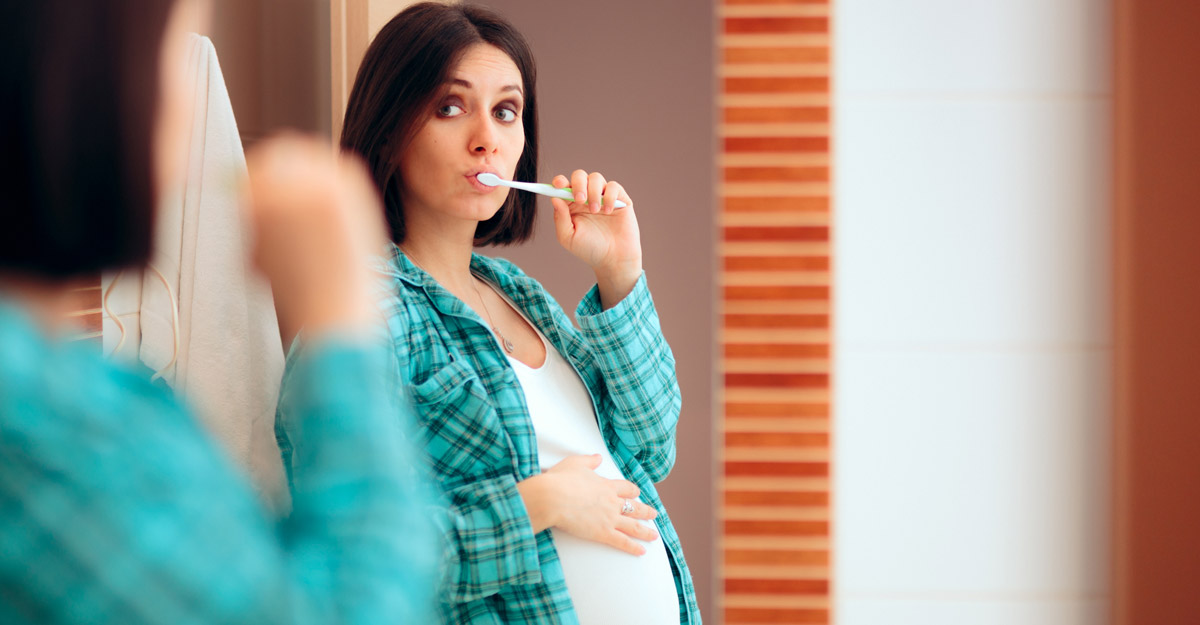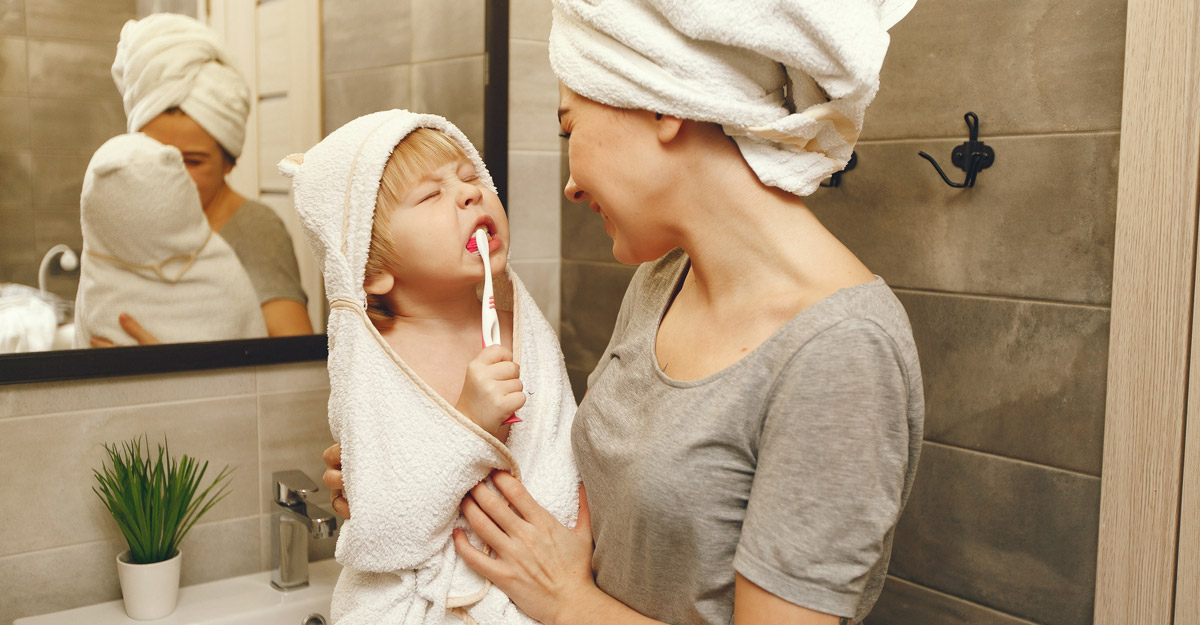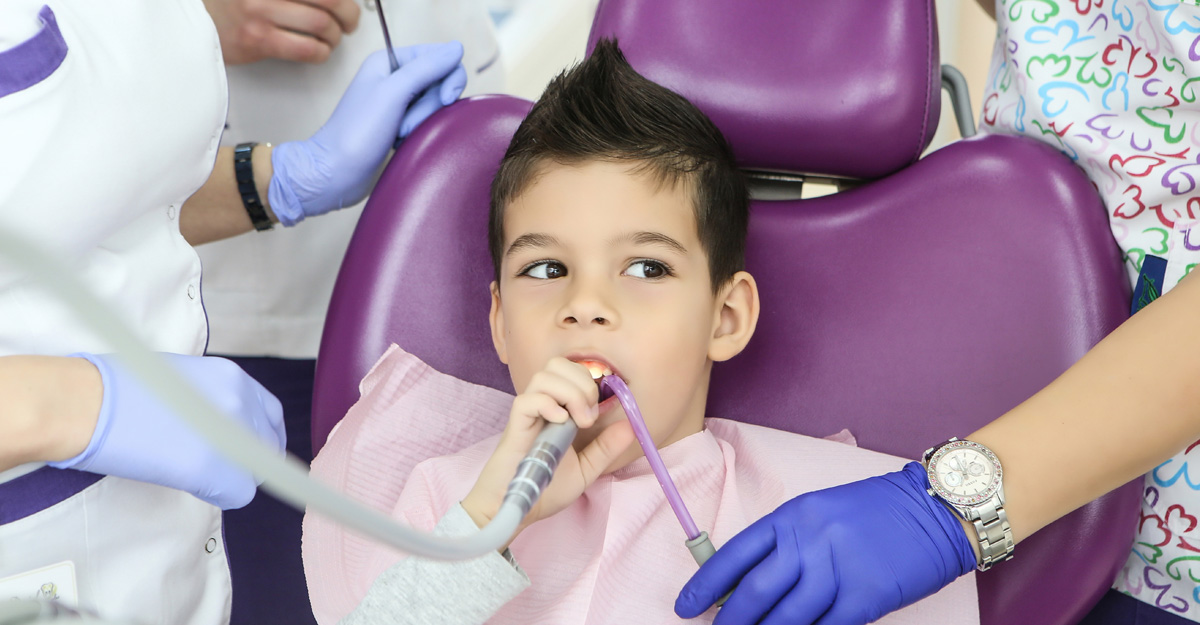When planning a pregnancy should not forget to visit your dentist before you became pregnant. Dental exam can identify potential problems which if they occurred during pregnancy are much harder to resolve. Teeth loss during pregnancy and significant incidence of dental and mouth diseases is not associated with the loss of calcium from the teeth, which is traditional belief. Teeth are not reserve of calcium and the baby does not draw it from them.
To prevent diseases of the teeth and mouth during pregnancy, better maintenance of oral hygiene is necessary because the risk of their occurrence is higher.

Children are born with all the primary teeth that are not visible because they are underneath the gums. Eruption of the first teeth usually begins around the sixth month. . While teething, first the gums get swollen; the oral mucosa is swollen and hurts. Appearance of hematoma at the site of tooth eruption is not a rare and it is natural. During the tooth eruption period time increased secretion of saliva is noticeable. Baby is often upset, irritable, and weepy and often refuses food. It puts various items in the mouth. During teething its advised not to feed babies with the food that is too hot or sweetened. In case baby refuses milk and food give it water at room temperature or lukewarm tea. In the first year it’s advisable to stimulate the child’s different functions (sucking, swallowing, chewing), because it improves the growth of the jaws and teeth, improves circulation and eases teething. Do not attempt to ease baby’s teething by using folk remedies, especially, wine because it is harmful for the baby very . Its important to start good care of the baby's mouth prior to the emergence of the first teeth. In a healthy and clean mouth sprout healthy teeth. Biggest danger to the health of your baby’s teeth is the food with lots of sugar. In contact with the teeth it becomes harmful, after ten minutes Baby have no desire for sugar until it try’s it, and when they do, it easily becomes a habit. Babies should get used to the food and beverage without additional sugar which is also pediatrician’s recommendation for proper development. As for the overall development of the baby and your baby's teeth the natural food should be used. Breast feeding is very useful for jaw growth and its evolution. During the first year of life, breast milk provides a sufficient quantity of sugar which has a positive impact on the teeth development.
Eruption of baby's teeth becomes around the six months of age. First ones to erupt are lower central incisors. Until the third birthday, the baby has all milky teeth. Between eighth and tenth month baby’s upper central incisors appear in the mouth Amongst the tenth and fourteenth month, lower and then the upper lateral incisors erupt .The first upper and lower molars, usually sprout after the first birthday. Between sixteenth and eighteenth month, is the time for canines -fangs. Eruption of the upper and lower molars happens at the end of the second year.
Then your baby has twenty- milky teeth which are just as important as permanent teeth. Therefore the maintenance of their hygiene is of extreme importance. Since children do not have sufficiently developed motor skills to take care, alone, of their personal hygiene, they do not have the ability to maintain oral hygiene. In order for children to maintain their milky teeth, the help of the adults, in this age, is needed.

Maintaining your baby’s oral hygiene begins immediately after its birth . Baby's mouth and tongue should be cleaned with moistened gauze wrapped around a finger or with specially designed handles that are placed on your finger. When baby’s first teeth appear ,they need to be brushed, twice a day. Start by using of toothbrushes for milky teeth, moistened with lukewarm water. Do not allow older people to kiss, the baby close to its mouth or hands, as a baby at this age often put their hands in the mouth. Take care of the hygiene of the items that baby puts in the mouth. Temperature of drinks and food in the baby's bottle or spoon should not be checked by putting it into your mouth. The American Association of children's dentists recommend that children up to the first birthday should be taken for a first dental checkup .Prevention of many oral diseases contribute to prevent health complications in the long run and its proved to be financially profitable. At the age between two and three years, be sure to train your child to give up sucking pacifiers or thumb. Sweetened juices and beverages in general, should only be used as part of a meal, not apart from them. Only 100% natural juices are recommended, at the most 100-150 ml of juice. Treat them as a candy. Do not allow your child to take sweetened drinks or juices at night, after brushing teeth. If children are given a drug or medication in the form of syrup, overnight, it is necessary to give water afterwards, as the majority of children's syrup contains large amounts of sugar. Medicines against colds reduce saliva production and thus eliminate basic dental care so in that case give the child some water every once in a while.

When a child is three years old it should begin to use the toothpaste with fluorides for that age group. Use a small amount of paste (max. Size of a small grain of corn). Teach your child to rinse and spit out the toothpaste after brushing. At this age its necessary visit to the dentist every six months, if not even more frequently. Seek the advice from dentists on how to improve the dental health of your child, since dental health of the child at this age depends only and exclusively from you! When a child’s healthy tooth erupts, nothing but good hygiene and compliance with dentists advice, affects that tooth health, until his ejection and replacement with permanent tooth. In preschool age child prepares to change milky teeth for permanent teeth (adult teeth). Milky teeth begin to fall out about the sixth year of age. Prior to the loss of milky teeth, about the sixth year, the first permanent tooth, first molar (six) appears in the mouth). Do not scare your child when it is playfully and when it refuses cooperation on brushing by going to the dentist, because it can be very counterproductive.

Around the sixth year of age, the first permanent molars appear in the mouth. If parents do not control regularly the child’s teeth, they do not notice its eruption, which often leads to the fact that they remain unclean. The first permanent molars are the teeth that are usually extracted in our population. Motor skills required to brush teeth, in this age group, are not sufficiently developed to be able maintain oral hygiene, themselves. Help the child to brush their teeth twice a day. The first molars during eruption are not in contact with the same tooth in the opposite jaw, so the possibility of a self-cleaning while chewing is nil. Soon after the eruption of the first permanent molars it is necessary to take the child to the dentist in order to protect it (the first molar), and thus reduce the possibility, that the rests of the food remain on those teeth, which increases the possibility of caries. In this age it is also necessary to visit to the dentist every six months, if not even more often. The Dentist can help with the eruption of permanent teeth and tell whether there is a necessity for exam by specialist in orthodontics.

Children at this age are very interested in their own appearance. The easiest way you can encourage them to improve oral hygiene and visit dentist regularly is by reminding them that healthy teeth, fresh breath and regularly warn orthodontic appliances (if they need it), help them to look best possible. Children who are involved in sports should use mouth protectors. Consult your dentist or hygienist about making individual mouthguard. Age from 10 to 13 years is the most convenient for teeth straightening. Take your child to see a specialist in orthodontics, if you have not already.